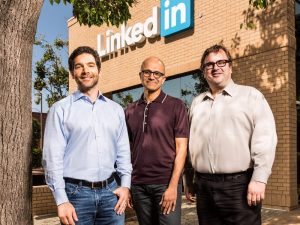CEO Satya Nadella was three years into a major overhaul of Microsoft when the company purchased the career networking site, LinkedIn, for $26 billion in 2017 and then left it largely to its own devices. The long-time CEO of LinkedIn, Jeff Weiner, stayed on as the company chief executive and continued to run the company independently.
Its policy of non-intervention is a newer direction for the software maker – one adopted after some earlier acquisitions ended with billions in losses. One such purchase was made by former CEO Steve Ballmer, who pushed through Microsoft’s $7.9 billion purchase of Finnish mobile manufacturer, Nokia, amidst objections from his leadership team. The deal was finalized in April 2014 and turned out to be a costly mistake after it was forced to write off billions of dollars in debt a short year later.
"It was a mistake, to begin with," said Jack Gold, principal analyst at J. Gold Associates, of the Nokia purchase in a 2015 interview. "A monumental mistake. Microsoft had no business being in the cut-throat, low-margin phone business."
In an early call to analysts, Nadella quoted Friedrich Nietzsche to make his point about the future direction of Microsoft. The software provider, he said, must have “courage in the face of reality” if they hoped to turn the company around at a time its core business was declining, and they were posting quarterly losses.
Nadella moved forward with transforming Microsoft from one reliant on traditional software-licensing to a 'mobile-first, cloud-first' company. He also worked to improve relationships with developers, partners, and investors – especially those in Silicon Valley – after a long history of the company thumbing its nose at outside collaborations. The purchase of San Francisco-based LinkedIn and the appointment of NorCal mover-and-shaker Reid Hoffman to its board of directors were part of a larger plan to put Microsoft on the map with Valley insiders.
Hoffman earned his Silicon Valley street cred through two decades of supporting startups – such as brokering Facebook’s first $500,000 investment, serving as a founding board member with Paypal, and assisting with starting up LinkedIn – and could serve as Microsoft’s ambassador to the rest of the tech community.
The main reason for the LinkedIn acquisition was to accelerate its growth, said Microsoft's CFO Amy Hood, and to develop its Office 365 and Dynamics 365 product lines further. Despite these goals, Nadella has been moving slowly with making changes, but plans for greater integration between the two technologies are underway.
Jeff Weiner has remained as LinkedIn's CEO and reports directly to Nadella. He reports that it's still early days, and more changes will be coming, including a greater connection between LinkedIn's Sales Navigator and Microsoft Dynamics sales software. There are also plans for a more comprehensive professional profile that would show LinkedIn details in Windows and Microsoft Office applications and an “Intelligent Newsfeed” for LinkedIn that collects data from MS offerings.
“We have a members-first approach,” he said. “So, it’s all about making sure we’re maintaining the trust of our membership. Microsoft has a very similar ethos with regard to how they secure the data of their customers, and just being very thoughtful in terms of the right way to roll this out and make sure that we create the right experience. So, there’s just been a lot of testing happening.”
LinkedIn is still expanding its membership base, which currently sits at 660 million members – up 52 percent from when Microsoft bought it in 2017. Weiner stated that becoming part of Microsoft's portfolio means they have been able to focus on a longer-term horizon, and its performance is ahead of schedule. He believes they could boost profitability by improving their billing infrastructure and working more closely with Microsoft sales teams.
“I think there’s opportunities to do that where we have a different customer set and different customer relationships, where Microsoft can potentially open doors by virtue of their relationships,” said Weiner.
























